Our Spreading the Love Sale Ends Today! Save 15% on Online Bundles and our Virtual Diabetes Ed Training Conference.
To celebrate, we are spreading the love with a 15% discount off
ALL Online Courses & Virtual Conference from Feb 10-17, 2023. Use code LOVE15 at checkout.
Want to learn more about Diabetes Care?
Virtual DiabetesEd Training Conference
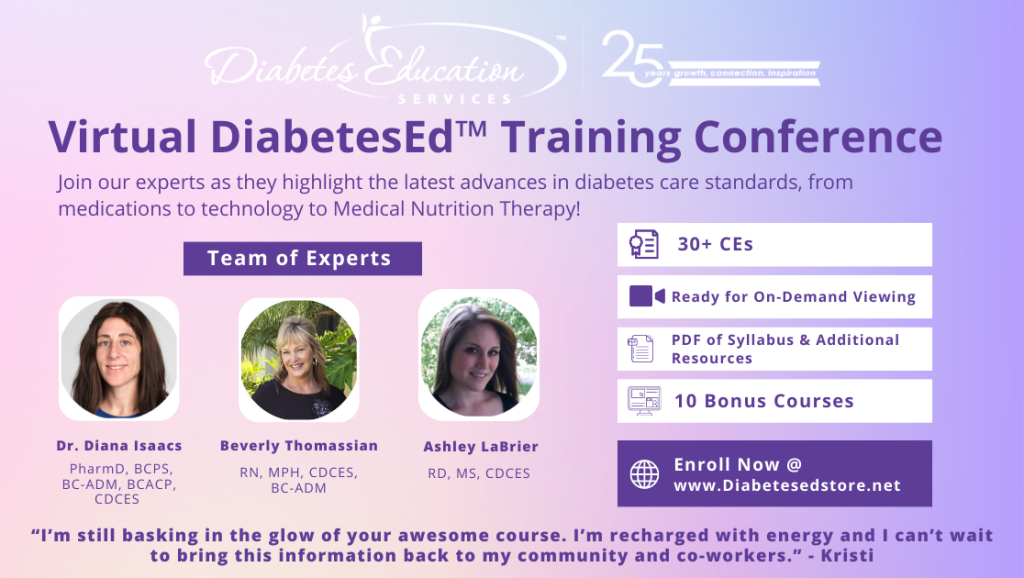
Whether you are new to diabetes or a seasoned expert, you’ll benefit from this virtual conference with the latest research plus critical content that you can immediately apply to your clinical practice.
If you are seeking a state-of-the-art review of current diabetes care, this course is for you. Our team has been fine-tuning this course for over fifteen years, and we know what you need. This program can also be a great addition to your CDCES or BC-ADM exam study plan.
Group discounts are available!*
Download Course Flyer | Download Schedule
“Not just a course – it’s an experience”
FREE Webinar – Preparing for 2023 BC-ADM Exam
Join Coach Beverly Feb. 20th @ 11:30 am PST

Join us to get ready to succeed at the 2023 BC-ADM Exam. This course will transform your test anxiety into calm self-confidence and test-taking readiness. Topics covered include:
- exam eligibility and test format,
- strategies to succeed
- study tips and test-taking tactics
Sign up for Diabetes Blog Bytes – we post one daily Blog Byte from Monday to Friday. And of course, Tuesday is our Question of the Week. It’s Informative and FREE! Sign up below!
The use of DES products does not guarantee the successful passage of the CDCES exam. CBDCE does not endorse any preparatory or review materials for the CDCES exam, except for those published by CBDCE.
Rationale of the Week | Low blood sugars and Beer

For last week’s practice question, we quizzed participants on low blood sugars and beer. 38% of respondents chose the best answer. We want to clarify and share this important information, so you can pass it on to people living with diabetes and your colleagues, plus prepare for exam success!
Before we start though, if you don’t want any spoilers and haven’t tried the question yet, you can answer it below: Answer Question
Question:
JL is 19 and has type 1 diabetes, drinks a “few beers” on the weekends with their college friends. JL uses an insulin pump, but mostly relies of fingerstick checks to monitor blood sugars. According to their log, JL experienced a few low blood glucose levels the past weekend of 62, 49, and 51.
Based on the ADA Standards, what is the most important recommendation for JL?
Answer Choices:
- Check BG at least 4 times a day when drinking.
- Make sure to eat carbs when drinking to avoid low blood glucose levels.
- Get glucagon rescue medication.
- Decrease or stop alcohol intake.
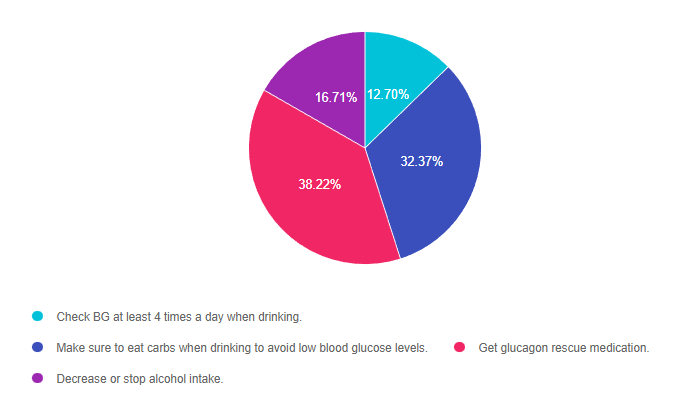
Getting to the Best Answer
Answer 1 is incorrect. 12.70% chose this answer, “Check BG at least 4 times a day when drinking.” This is a juicy answer. Although monitoring will help JL detect low blood sugars, it doesn’t necessarily translate into taking action to prevent or treat these frequent bouts of level 2 hypoglycemia.
Answer 2 is incorrect. 32.37% of you chose this answer, “Make sure to eat carbs when drinking to avoid low blood glucose levels.” This is another juicy answer and a solid recommendation. For people with type 1 who experience hypoglycemia when drinking alcohol, eating 15gms of carb along with each alcohol serving can help maintain glucose levels. However, this answer is not based on the ADA Standards of Care.
Answer 3 is correct. 38.22% of respondents chose this answer, “Get glucagon rescue medication.” This is the BEST answer. According to the ADA’s Standard 6 on Glycemic Targets, “6.12 Glucagon should be prescribed for all individuals at increased risk of level 2 or 3 hypoglycemia, so that it is available should it be needed”. JL is experiencing Level 2 hypoglycemia with glucose levels dropping to 49 and 51. (see image from Glucagon PocketCard to right for Hypo Levels). While prevention of hypoglycemia is the long term goal, in the short term we need to make sure JL has access to a glucagon rescue med and that their significant others are trained on how to administer this life saving glucose booster.
Finally, Answer 4 is incorrect. 16.71% chose this answer, “Decrease or stop alcohol intake.” While we might want to have a conversation about alcohol and safety, the ADA Standards allow for 1 alcohol serving a day for women and 2 alcohol servings a day for men. In this situation, we might want to discuss adjusting insulin dosing and carbohydrate intake to prevent future bouts of hypoglycemia. However, for safety sake, JL will need a glucagon rescue med prescribed in case of a severe low blood glucose.
Thank you so much for reading this “Rationale of the Week”. For more information on this topic, we encourage you to join our Online Courses and Virtual DiabetesEd Training Program.
Preparing for Diabetes Certification Exam?
It’s not too late to enroll in our Level 3 – Boot Camp 2023
Level 3 | DiabetesEd Specialist Boot Camp | 12+ CEs

Can’t join all the sessions live? No problem. Your registration guarantees you access to the recorded lectures for a full year.
This bundle is specifically designed for healthcare professionals who are studying for the Board Certified in Advanced Diabetes Management (BC-ADM) or the Certified Diabetes Care and Education Specialist (CDCES) certification exam.
Intended Audience: This library of critical information is designed for individuals or groups of diabetes specialists, including RNs, RDs, Pharmacists, Nurse Practitioners, Clinical Nurse Specialists, Physician Assistants, and other health care providers interested in staying up to date on current practices of care for people with diabetes and preparing for the BC-ADM or the CDCES certification Exam.
2023 Webinar Updates
- Recorded & Ready to Watch – Class 1 – Diabetes – Not Just Hyperglycemia 1.75 CEs
- Recorded & Ready to Watch – Class 2 – Standards of Care & Cardiovascular Goals 1.8 CEs
- Recorded & Ready to Watch – Class 3 – Meds for Type 2 – What you need to know 1.5
- February 16, 2023 – Class 4 – Insulin Therapy – From Basal/Bolus to Pattern Management 1.5 CEs
- February 21, 2023 – Class 5 – Insulin Intensive – Monitoring, Sick Days, Lower
- February 23, 2023 – Class 6 – Exercise and Medical Nutrition Therapy 1.5 CEs
- February 28, 2023 – Class 7 – Screening, Prevention, and Treatment of Microvascular Complications
- March 2, 2023 – Class 8 – Coping and Behavior Change 1.5 CEs
- March 9, 2023 – Class 9 – Test-Taking Coach Session (48 Questions) No CE
All hours earned count toward your CDCES Accreditation Information
Sign up for Diabetes Blog Bytes – we post one daily Blog Byte from Monday to Friday. And of course, Tuesday is our Question of the Week. It’s Informative and FREE! Sign up below!
The use of DES products does not guarantee the successful passage of the CDCES exam. CBDCE does not endorse any preparatory or review materials for the CDCES exam, except for those published by CBDCE.
New “Zavvy” SGLT-2 Inhibitor Approved
There are now five SGLT-2 Inhibitors that are FDA approved for the treatment of diabetes. The latest one is bexagliflozin (Brenzavvy). We created the chart below to summarize the features and indications of the various SGLT-2i’s. We have also updated our eMedication PocketCard, with this 5th SGLT-2i.
According to TheracosBio, FDA approval of bexagliflozin was based on 23 studies in over 5,000 patients with type 2 diabetes. At a dose of 20mg a day, bexagliflozin decreases A1C by 0.6% to 1.0%, decreases body weight by about 3 kg and drops systolic blood pressure almost 3 mm Hg on average. This treatment can be utilized as a monotherapy or combined with metformin or as an add-on to standard-of-care treatment, including metformin, sulfonylureas, insulin, DPP-IV inhibitors or combinations of all these agents.
GFR cut off of 30: For those with chronic kidney disease, bexagliflozin was safe and well tolerated, however it is not recommended if the eGFR less than 30 mL/min/1.73 m2 and is contraindicated for those on dialysis.
No additional CV benefit data. Bexagliflozin was not found to be superior to placebo in reducing MACE (a composite of cardiovascular death, nonfatal myocardial infarction, nonfatal stroke, and hospitalization for unstable angina). In a trial that included patients with type 2 diabetes and either established CVD or multiple risk factors for CVD, 10.1% (57/567) of the placebo group experienced 1 MACE event vs 7.9% (89/1132) of the bexagliflozin group. However, while the phase 3 data do not indicate any apparent CVD risk, a robust CVD outcomes trial has not been done.
Lower extremity caution: An increased, although not statistically significant, incidence of lower limb amputations was observed among patients treated with bexagliflozin (8.3 vs. 5.1 events per 1,000 patient-years; HR = 1.64, 95% CI, 0.70, 3.82).
Other warnings include genital mycotic infections, DKA, volume depletion, urinary tract infections and urosepsis, similar to other SGLT-2 inhibitors. Read more here.
Download eMedication PocketCard
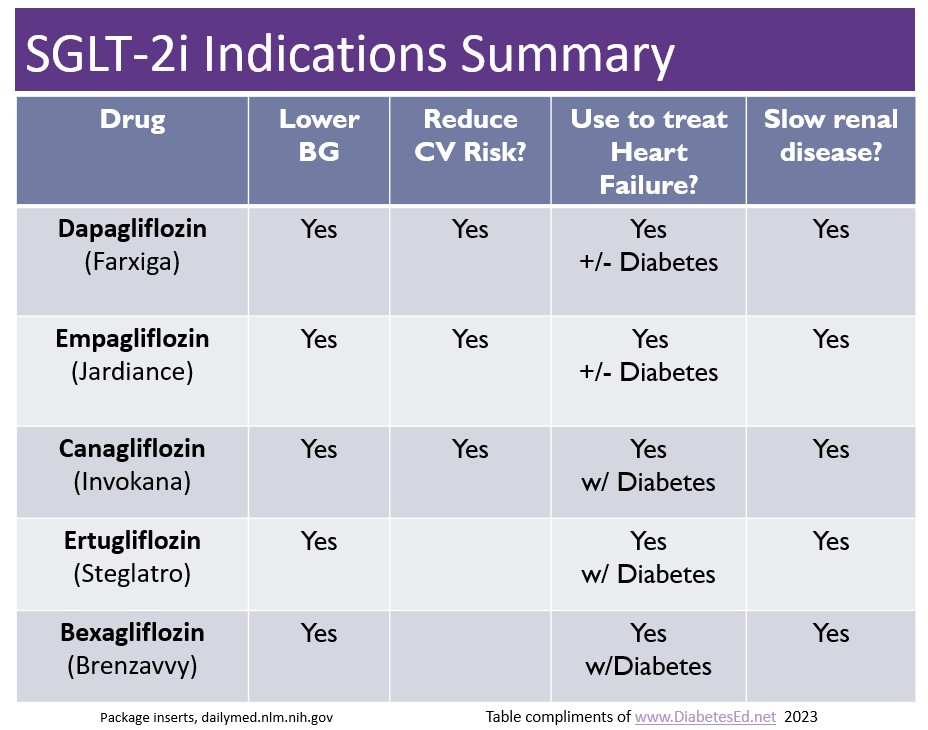
Question of the Week | February 14, 2023

JR is 67 with type 1 diabetes and was discharged a few months ago after receiving a coronary artery bypass. JR is on insulin pump therapy and a CGM, with a recent A1C of 6.7%. Their blood pressure is 129/78.
Other recent labs include:
- LDL cholesterol of 67 mg/dL
- HDL 54 mg/dL
- Triglycerides 172 mg/dL
- UACR 23 mg/g GFR 61
JR’s medications include: insulin, atorvastatin 80mg, atenolol 50mg, and aspirin therapy. JR has met with the dietitian and is trying to eat healthfully. They have lost 5 pounds over the past few months.
Based on the 2023 ADA Standards of Care and JR’s history, which of the following is considered best practice?
- Add an ACE or ARB
- Keep LDL cholesterol less than 70 mg/dL
- Increase fiber intake by 20%
- Add ezetimibe (Zetia) or a PCSK9
Click Here to Test your Knowledge
Happy Valentine’s Day, to show our love and appreciation, we are offering 15% off all Online Courses!
Our annual Valentine’s sale is our way of thanking you, our dedicated community of diabetes health care professionals and advocates, for your service and love.
To celebrate, we are spreading the love with a 15% discount off
ALL Online Courses & Virtual Conference from Feb 10-17, 2023. Use code LOVE15 at checkout.
Sign up for Diabetes Blog Bytes – we post one daily Blog Byte from Monday to Friday. And of course, Tuesday is our Question of the Week. It’s Informative and FREE! Sign up below!
The use of DES products does not guarantee the successful passage of the CDCES exam. CBDCE does not endorse any preparatory or review materials for the CDCES exam, except for those published by CBDCE.
Rationale of the Week | Safe for Surgery?

For last week’s practice question, we quizzed participants on the best action for a safe surgery. 51% of respondents chose the best answer. We want to clarify and share this important information, so you can pass it on to people living with diabetes and your colleagues, plus prepare for exam success!
Before we start though, if you don’t want any spoilers and haven’t tried the question yet, you can answer it below: Answer Question
Question:
PZ is having elective surgery in the morning. Diabetes medications include 20 units glargine (Semglee) at hs, metformin BID and empagliflozin (Jardiance).
According to 2023 ADA Standards, what are the best actions for a safe surgery?
Answer Choices:
- Give 15 units hs glargine, hold am oral meds, keep intraoperative glucose between 100-180.
- Give 10 units hs glargine and am metformin, hold empagliflozin and use sliding scale as needed.
- Give 20 units glargine, hold oral meds, get A1C less than 7% within 3 months before surgery.
- Hold all oral meds for 3 days, given 50% of basal insulin and maintain glucose 80-140 intraoperatively.
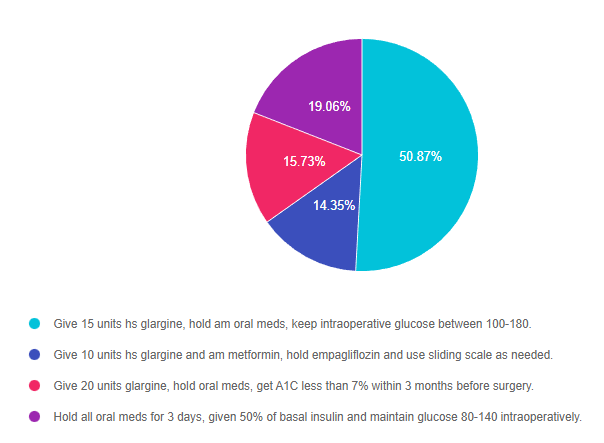
Getting to the Best Answer
Answer 1 is correct. 50.87% chose this answer, “Give 15 units hs glargine, hold am oral meds, keep intraoperative glucose between 100-180.” YES, GREAT JOB! The ADA Standard 16 on Hospitalization has been updated with new perioperative glucose goals and preop medication adjustments. To prevent intraoperative hypoglycemia, the glucose goal was increased to 100-180. In addition, they recommend reducing basal insulin by 20-25% the night before surgery and holding all oral meds the morning of surgery. SGLT-2s are held for 3-4 days before surgery to decrease risk of DKA in the perioperative period. In this vignette, we reduced PZ’s basal insulin from 20 units to 15 units (25% decrease) and held all oral meds the morning of surgery. In addition, the 2023 Standards recommend achieving an A1C less than 8% before elective surgeries. Since about 20% of people undergoing surgery have diabetes, these guidelines are super helpful and important to improve post surgical outcomes.
Answer 2 is incorrect. 14.35% of you chose this answer, “Give 10 units hs glargine and am metformin, hold empagliflozin and use sliding scale as needed.” This is answer is close and partly correct, because it recommends holding the oral medications. However, the first part of the answer is incorrect since a basal insulin reduction of 50% is too aggressive. People release lots of counterregulatory hormones during surgery, so they still need at least 75% of their usual basal insulin dose to prevent intraoperative hyperglycemia. If the person uses NPH basal insulin, they would need to reduce the evening dose by 50%. Since about 20% of people undergoing surgery have diabetes, these guidelines are super helpful and important to improve post surgical outcomes.
Answer 3 is incorrect. 15.73% of respondents chose this answer, “Give 20 units glargine, hold oral meds, get A1C less than 7% within 3 months before surgery.” This is answer is close and partly correct, because it recommends holding the oral medications. However, the first part of the answer is incorrect since the basal insulin needs to be reduced by 20-25% to prevent intraoperative hypoglycemia. In addition, the 2023 Standards recommend achieving an A1C less than 8% (not 7%) before elective surgeries. Since about 20% of people undergoing surgery have diabetes, these guidelines are super helpful and important to improve post surgical outcomes.
Finally, Answer 4 is incorrect. 19.06% chose this answer, “Hold all oral meds for 3 days, given 50% of basal insulin and maintain glucose 80-140 intraoperatively.” This entire answer is incorrect for the following reasons. Oral meds are held the day of surgery, except for SGLT2i’s, which are held for 3-4 days pre-op. As far as basal insulin, the ADA guidelines recommend giving 75-80% of usual dose, except for NPH insulin, which is reduced by 50%. Lastly, the intraoperative glucose target is 100 -180. Since about 20% of people undergoing surgery have diabetes, these guidelines are super helpful and important to improve post surgical outcomes.
Thank you so much for reading this “Rationale of the Week”.
We invite you to join Coach Beverly on May 30, 2023 – Hospital and Hyperglycemia 1.5 CEs
Want to learn more about this question? Enroll in our
Level 2 | ADA Standards of Care CE Course | 2.0 CEs
2023 Update is Recorded & Ready to Watch!

This course, updated annually, is an essential review for anyone in the field of diabetes. Join Coach Beverly as she summarizes the 2023 updates to the American Diabetes Association’s Standards of Medical Care in Diabetes and provides critical teaching points and content for healthcare professionals involved in diabetes care and education.
Objectives:
- List significant changes and updates to the 2023 ADA Standards of Medical Care.
- State 3 updates on new blood pressure and lipid goals.
- Identify 5 key elements of the position statement.
- Discuss how to apply the Standards in the clinical setting and in preparation for exam success.
Intended Audience: This course is a knowledge-based activity designed for individuals or groups of diabetes professionals, including RNs, RDs, Pharmacists, Nurse Practitioners, Clinical Nurse Specialists, Physician Assistants, and other health care providers interested in staying up to date on current practices of care for people with prediabetes, diabetes, and other related conditions.
Don’t worry if you can’t make it live. Your registration guarantees access to the recorded version in the Online University.
All hours earned count toward your CDCES Accreditation Information
Preparing for Diabetes Certification Exam? Enroll in our Level 3 – Boot Camp 2023 Updates
Level 3 | DiabetesEd Specialist Boot Camp | 12+ CEs

Can’t join all the sessions live? No problem. Your registration guarantees you access to the recorded lectures for a full year.
This bundle is specifically designed for healthcare professionals who are studying for the Board Certified in Advanced Diabetes Management (BC-ADM) or the Certified Diabetes Care and Education Specialist (CDCES) certification exam.
Intended Audience: This library of critical information is designed for individuals or groups of diabetes specialists, including RNs, RDs, Pharmacists, Nurse Practitioners, Clinical Nurse Specialists, Physician Assistants, and other health care providers interested in staying up to date on current practices of care for people with diabetes and preparing for the BC-ADM or the CDCES certification Exam.
2023 Webinar Updates
- Recorded & Ready to Watch – Class 1 – Diabetes – Not Just Hyperglycemia 1.75 CEs
- February 9, 2023 – Class 2 – Standards of Care & Cardiovascular Goals 1.8 CEs
- February 14, 2023 – Class 3 – Meds for Type 2 – What you need to know 1.5
- February 16, 2023 – Class 4 – Insulin Therapy – From Basal/Bolus to Pattern Management 1.5 CEs
- February 21, 2023 – Class 5 – Insulin Intensive – Monitoring, Sick Days, Lower
- February 23, 2023 – Class 6 – Exercise and Medical Nutrition Therapy 1.5 CEs
- February 28, 2023 – Class 7 – Screening, Prevention, and Treatment of Microvascular Complications
- March 2, 2023 – Class 8 – Coping and Behavior Change 1.5 CEs
- March 9, 2023 – Class 9 – Test-Taking Coach Session (48 Questions) No CE
All hours earned count toward your CDCES Accreditation Information
Sign up for Diabetes Blog Bytes – we post one daily Blog Byte from Monday to Friday. And of course, Tuesday is our Question of the Week. It’s Informative and FREE! Sign up below!
The use of DES products does not guarantee the successful passage of the CDCES exam. CBDCE does not endorse any preparatory or review materials for the CDCES exam, except for those published by CBDCE.
$35 Cap on Insulin for Medicare Recipients?
Starting in 2023, the Inflation Reduction Act, limits insulin out-of-pocket costs at $35 for a month for each insulin product covered by an individual’s Medicare Part D prescription drug plan or Medicare Advantage plan.

Under a Medicare Part D prescription drug plan, if insulin is a covered insulin product, the $35 cap for a month’s supply for each insulin product applies, beginning on January 1, 2023.
A covered insulin product is one that is included in a Part D sponsor’s formulary.
This includes any new insulin products that become available during the plan year. An insulin product might also be considered covered in other instances and there can be changes in covered products during the year.
In addition, under Medicare Part B, if insulin is delivered through a traditional pump that is covered under the durable medical equipment benefit, the cost-sharing amount for a person with Medicare is capped at $35 for a month’s supply of insulin beginning July 1, 2023.
The cap applies only to insulin products on a plan’s formulary, or the list of covered medications.
Unfortunately, most drug plans don’t cover the more than 70 insulin products on the market. And some plans actually charge less than $35 a month for particular products, but those lower copays are difficult to ferret out on the Medicare Plan Finder. Adding to the complexity of making a choice of plans, many people with diabetes use several prescription drugs besides insulin.
End result: Finding the lowest-cost, most effective plan that covers all of a participant’s medicines among the 20 or more plans that might be offered in someone’s zip code can be complicated, at least for 2023.

Strategies to succeed? Medicare officials and the local offices that support beneficiaries strongly recommend getting help. “People with Medicare who take insulin are encouraged to call 1-800-MEDICARE or to contact their State Health Insurance Assistance Programs (SHIP) for help comparing coverage and costs this year,” Meena Seshamani, M.D., director of CMS’s Center for Medicare, said in an emailed statement. This is just a one-year glitch, the Centers for Medicare & Medicaid Services says, so it’s best handled by those with practice navigating the Plan.
Experts suggest Medicare recipients make a list of all their prescriptions, including the dosages and how often they are refilled. Then go to Medicare.gov and create an account — it allows individuals to store their drug list securely, which can speed up the task of finding a plan.
Then they have two choices:
- Call 1-800-MEDICARE and seek help there, or
- Go to the SHIP website to look up the agency that administers SHIP in your state.
The best bet is to call the state agency to find the county or other local office and contact a trained counselor who can analyze plan options. SHIPs objective is to provide comprehensive, unbiased information on Medicare. The counselor will make sure, for example, that any Medicare Advantage plan you consider actually covers the insulin products you need.
Click the Links Below for More Info.
Don’t worry if you can’t make our webinars live. Your registration guarantees access to the recorded version in the Online University.
All hours earned count toward your CDCES Accreditation Information
Sign up for Diabetes Blog Bytes – we post one daily Blog Byte from Monday to Friday. And of course, Tuesday is our Question of the Week. It’s Informative and FREE! Sign up below!
The use of DES products does not guarantee the successful passage of the CDCES exam. CBDCE does not endorse any preparatory or review materials for the CDCES exam, except for those published by CBDCE.
Question of the Week | Low blood sugars and Beer

JL is 19 and has type 1 diabetes, drinks a “few beers” on the weekends with their college friends. JL uses an insulin pump, but mostly relies of fingerstick checks to monitor blood sugars. According to their log, JL experienced a few low blood glucose levels the past weekend of 62, 49 and 51.
Based on the ADA Standards, what is the most important recommendation for JL?
- Check BG at least 4 times a day when drinking.
- Make sure to eat carbs when drinking to avoid low blood glucose levels.
- Get glucagon rescue medication.
- Decrease or stop alcohol intake.
Click Here to Test your Knowledge
Our Level 3 – Boot Camp 2023 Updates start today!
It’s not too late to register, click below to enroll!
Level 3 | DiabetesEd Specialist Boot Camp | 12+ CEs

Can’t join all the sessions live? No problem. Your registration guarantees you access to the recorded lectures for a full year.
This bundle is specifically designed for healthcare professionals who are studying for the Board Certified in Advanced Diabetes Management (BC-ADM) or the Certified Diabetes Care and Education Specialist (CDCES) certification exam.
Intended Audience: This library of critical information is designed for individuals or groups of diabetes specialists, including RNs, RDs, Pharmacists, Nurse Practitioners, Clinical Nurse Specialists, Physician Assistants, and other health care providers interested in staying up to date on current practices of care for people with diabetes and preparing for the BC-ADM or the CDCES certification Exam.
2023 Webinar Updates
- February 7, 2023 – Class 1 – Diabetes – Not Just Hyperglycemia 1.75 CEs
- February 9, 2023 – Class 2 – Standards of Care & Cardiovascular Goals 1.8 CEs
- February 14, 2023 – Class 3 – Meds for Type 2 – What you need to know 1.5
- February 16, 2023 – Class 4 – Insulin Therapy – From Basal/Bolus to Pattern Management 1.5 CEs
- February 21, 2023 – Class 5 – Insulin Intensive – Monitoring, Sick Days, Lower
- February 23, 2023 – Class 6 – Exercise and Medical Nutrition Therapy 1.5 CEs
- February 28, 2023 – Class 7 – Screening, Prevention, and Treatment of Microvascular Complications
- March 2, 2023 – Class 8 – Coping and Behavior Change 1.5 CEs
- March 9, 2023 – Class 9 – Test-Taking Coach Session (48 Questions) No CE
All hours earned count toward your CDCES Accreditation Information
Sign up for Diabetes Blog Bytes – we post one daily Blog Byte from Monday to Friday. And of course, Tuesday is our Question of the Week. It’s Informative and FREE! Sign up below!
The use of DES products does not guarantee the successful passage of the CDCES exam. CBDCE does not endorse any preparatory or review materials for the CDCES exam, except for those published by CBDCE.
Rationale of the Week | Diabetes and NASH, what is the link?

For last week’s practice question, we quizzed participants on Diabetes and NASH. 41% of respondents chose the best answer. We want to clarify and share this important information, so you can pass it on to people living with diabetes and your colleagues, plus prepare for exam success!
Before we start though, if you don’t want any spoilers and haven’t tried the question yet, you can answer it below: Answer Question
Question:
The provider referred RT, a 72-year-old with type 2 diabetes and non-alcoholic fatty steatohepatitis (NASH), for an appointment with the diabetes care and education specialist. RT is frightened because their brother died of liver cancer.
Which of the following is the most accurate statement regarding NASH and diabetes?
Answer Choices:
- NASH is when intrahepatic fat is equal to or greater than 5% of liver weight.
- About 30% of people with diabetes and extra weight also have NASH.
- There are standardized medication algorithms to guide the treatment of NASH.
- Risk of NASH is greater in people who consume excess alcohol and processed foods.
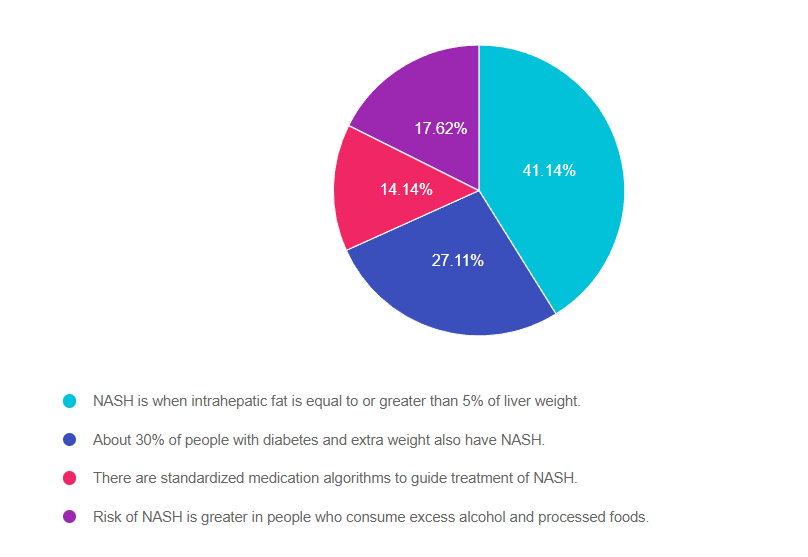
Getting to the Best Answer
Answer 1 is correct. 41.14% chose this answer, “NASH is when intrahepatic fat is equal to or greater than 5% of liver weight.” GREAT JOB! According to ADA Standard 4, “NASH is defined histologically as having more than 5% hepatic steatosis and associated with inflammation and hepatocyte injury (hepatocyte ballooning), with or without evidence of liver fibrosis”.
Answer 2 is incorrect. 27.11% of you chose this answer, “About 30% of people with diabetes and extra weight also have NASH.” This is a juicy answer, but it is an underestimate of the current problem. Recent studies in adults in the U.S. estimate that more than 70% of people with type 2 diabetes have non alcoholic fatty liver disease (NAFLD). The more serious, steatohepatitis, is estimated to affect more than 50% of people with type 2 diabetes with NAFLD and it appears to be a driver for the development of fibrosis.
Answer 3 is incorrect. 14.14% of respondents chose this answer, “There are standardized medication algorithms to guide the treatment of NASH.” According to ADA Standard 4, at present, there are no FDA-approved drugs for the treatment of NASH. Therefore, treatment for people with type 2 diabetes and NASH is centered on the dual purpose of treating hyperglycemia and weight loss. Pioglitazone and some glucagon-like peptide 1 receptor agonists (GLP-1 RAs) have been shown to be effective to treat steatohepatitis, may slow fibrosis progression, and decrease cardiovascular disease.
Finally, Answer 4 is incorrect. 17.62% chose this answer, “Risk of NASH is greater in people who consume excess alcohol and processed foods.” Nonalcoholic steatohepatitis [NASH] indicates liver inflammation in the absence of ongoing or recent consumption of significant amounts of alcohol (defined as ingestion of >21 standard drinks per week in men and >14 standard drinks per week in women over a 2-year period preceding evaluation) or the presence of other secondary causes of fatty liver disease. NASH is not a result of excess alcohol intake and is usually associated with genetics, body weight and insulin resistance.
Thank you so much for reading this “Rationale of the Week”.
We also invite you to join our Online Courses for more information (see info below)
Hope you can join our Diabetes Boot Camp in February and our other Level 2 Courses.
Preparing for Diabetes Certification Exam? Enroll in our Level 3 – Boot Camp 2023 Updates
Level 3 | DiabetesEd Specialist Boot Camp | 12+ CEs

Can’t join all the sessions live? No problem. Your registration guarantees you access to the recorded lectures for a full year.
This bundle is specifically designed for healthcare professionals who are studying for the Board Certified in Advanced Diabetes Management (BC-ADM) or the Certified Diabetes Care and Education Specialist (CDCES) certification exam.
Intended Audience: This library of critical information is designed for individuals or groups of diabetes specialists, including RNs, RDs, Pharmacists, Nurse Practitioners, Clinical Nurse Specialists, Physician Assistants, and other health care providers interested in staying up to date on current practices of care for people with diabetes and preparing for the BC-ADM or the CDCES certification Exam.
2023 Webinar Updates
- February 7, 2023 – Class 1 – Diabetes – Not Just Hyperglycemia 1.75 CEs
- February 9, 2023 – Class 2 – Standards of Care & Cardiovascular Goals 1.8 CEs
- February 14, 2023 – Class 3 – Meds for Type 2 – What you need to know 1.5
- February 16, 2023 – Class 4 – Insulin Therapy – From Basal/Bolus to Pattern Management 1.5 CEs
- February 21, 2023 – Class 5 – Insulin Intensive – Monitoring, Sick Days, Lower
- February 23, 2023 – Class 6 – Exercise and Medical Nutrition Therapy 1.5 CEs
- February 28, 2023 – Class 7 – Screening, Prevention, and Treatment of Microvascular Complications
- March 2, 2023 – Class 8 – Coping and Behavior Change 1.5 CEs
- March 9, 2023 – Class 9 – Test-Taking Coach Session (48 Questions) No CE
All hours earned count toward your CDCES Accreditation Information
Sign up for Diabetes Blog Bytes – we post one daily Blog Byte from Monday to Friday. And of course, Tuesday is our Question of the Week. It’s Informative and FREE! Sign up below!
The use of DES products does not guarantee the successful passage of the CDCES exam. CBDCE does not endorse any preparatory or review materials for the CDCES exam, except for those published by CBDCE.








